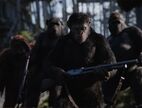1. Look at people's burdens, not strenuous
In the plots of the last two films, human beings have gained the same intelligence as humans because of out-of-control scientific experiments. Among them, the orangutan Caesar, who was raised by humans since childhood, became the leader of the orangutan tribe because he led the orangutans to resist human enslavement. Soon, a plague that swept the world took away most of the human lives. Caesar's subordinate Kuba, because he could not forget the harm caused by humans, suggested that Caesar take advantage of the weakening of human beings to destroy human beings and dominate the earth. But the kind-hearted Caesar just wanted to protect his own race and keep the peace with humans like a well and not a river, so he had no intention of going to war with humans. Kuba was therefore dissatisfied with Caesar, waited for the opportunity to launch a rebellion, imprisoned Caesar, stole the leadership of the tribe, and led the orangutans to wage war against the remaining humans. At the last moment, with the help of humans, Caesar eliminated Kuba, regained leadership, and maintained peace between the two races of humans and orangutans.
In the third installment, the leader of the human army becomes the ruthless Colonel McCullough, who believes that orangutans are stronger than humans and have acquired an IQ equal to that of humans, so sooner or later they will replace humans and become the masters of the earth. To this end, he wanted to preemptively eliminate the orangutan, so war broke out again between humans and the orangutan.
However, Caesar was still reluctant to be an enemy of humans, and even prepared to relocate his family to avoid war. But on the eve of their departure, the colonel personally led a human army to raid the orangutan base. The orangutans were caught off guard and suffered heavy casualties. Caesar's wife and eldest son were also killed by the colonel. The death of a loved one left Caesar grief-stricken and at the same time uncontrollable anger towards the colonel. In a fit of rage, Caesar decided to let the orangutans migrate to their new homeland, and went to seek revenge on the colonel alone, and the story behind it began.
The final plot is, of course, that Caesar went through all kinds of hardships and finally brought the tribes to a new safe home. The grievances between the orangutans and humans finally came to an end, and Caesar himself passed away because of his injuries. The Rise of the Planet of the Apes series is due to Caesar's death ended.
Caesar has a strong hatred for the colonel and wants to kill him to avenge his wife and children, but based on the powerful strength of the human army, killing the colonel is not only hopeless, but also dangerous. Therefore, in the process of seeking revenge, Caesar's long-term friend, Maurice the orangutan, persuaded Caesar to give up revenge, but Caesar was deeply engulfed in hatred and insisted on continuing. At this time, Morris said in sign language leisurely: "You are like Kuba back then, you can't let go of the hatred in your heart." Caesar was quite shocked when he heard the words, because he didn't expect that he would be like Kuba, he thought That's just a mistake that Kuba makes, and he has already learned to forgive and forgive. However, although Caesar realized that there was a problem with his mentality and was willing to admit his mistake, he still chose to continue the road of revenge.
Seeing this, I am reminded of an old Chinese saying, "It's not too hard to see a person carry a burden." When many unfortunate things happen to others, we can't feel the pain of the person involved. Furthermore, we will make a lot of evaluations that we take for granted, and consolation that we take for granted. It seems that a few words can resolve the huge inner confusion and pain of the client. And only when we are in the same situation, will we understand how absurd and unreasonable the previous condescending attitude is, and will we understand those so-called words of consolation, which in many cases only aggravate the suffering of the client , without any consolation. In the movie, on the top of the snowy mountain, Caesar faced Morris' sign language and deeply realized this, and he began to understand Kuba's state of mind.
Later, Caesar found that his tribe was all captured by the colonel's army during the migration process, and enslaved by humans to build projects for them. Caesar was also captured by the colonel in order to rescue his own clan members. After the colonel knew Caesar's identity, he tried to persuade him to lead the gorillas to work for the human army, but Caesar did not cooperate. To this end, the colonel had a conversation with him.
The colonel told Caesar that human beings were on the brink of extinction. In addition to the intelligence and physical ability of the orangutans, human beings themselves were also faced with a virus threat. People infected with the virus will not die, but will lose their language skills and their IQ will gradually degenerate to the level of animals. The colonel said that this is nature's punishment for human beings, making human beings, who were once the spirit of all things and the ruler of the earth, become as ignorant and ignorant as animals and accept the rule of the orangutans who were once despised by them.
There is no cure for this virus, and the only way to stop the spread of the virus is to kill the infected. The colonel's only son was also infected with this virus before. Between family affection and the fate of all human beings, the colonel went through a huge and painful inner struggle and entanglement, and finally killed his only son with his own hands. At the moment when the trigger was pulled, the colonel said, "I purified my heart", meaning that he was finally freed from his personal emotional entanglements, and from then on, he devoted all his energy to preventing the demise of mankind. Others did not agree with the colonel's brutal and rude practice, and still sought medical means to stop the spread of the virus. Therefore, infighting broke out between the two factions. The colonel's base was facing the attack of the human opposition army, so the colonel Need Caesar to lead the orangutans to build fortifications. In the Colonel's view, this was a step in a larger plan to save all humanity.
Caesar's expression was utterly amazed throughout the entire process described by the colonel. He didn't think that the colonel, like him, suffered the pain of losing his son, and he was the only son; it was even more difficult for him to imagine that the colonel could kill his only son with his own hands, and the reason was to save all mankind. From the above two points, the pain that the colonel has endured is greater than that of him, and the colonel's heart is also more selfless. Relatively speaking, Caesar just wanted to avenge his own personal revenge, but ignored the responsibility of leading the entire tribe to migrate to a new home.
Although at the end of the exchange between the colonel and Caesar, Caesar was still provoked by the words of the colonel, remembering the sadness and anger of the death of his relatives, and then tried to attack the colonel, but the things the colonel told made Caesar begin to re-examine the colonel. He also began to reflect on his revenge mentality, which laid an important foreshadowing for the final outcome between the two.
The climax of the film is that the human opposition army began to attack the colonel's base. After Caesar arranged for all members of the tribe to escape, he returned to the second floor of the base where the colonel was located by himself, ready to kill the colonel to avenge his wife and children. At this time, he was still With a strong hatred of the colonel.
However, when Caesar found the colonel, he found that he was also infected with the virus, he could no longer speak, his physical function began to decline, and he was struggling in bed. Caesar easily picked up the gun the Colonel had kept on his bedside table and pointed it at the Colonel's head. At this time, the colonel also discovered that it was Caesar. Instead of escaping, he made a move that shocked Caesar: he took Caesar's hand with his hand and pulled it toward himself, so that Caesar could put a gun against his head. The colonel then opened the safety of the gun himself and attempted to kill himself by pressing Caesar's finger on the trigger.
Facing this behavior of the colonel, Caesar completely collapsed. He looked sad and burst into tears. He never thought that the Colonel would be so bent on begging for death, and he no longer had any hatred for the Colonel. Finally, Caesar pulled the Colonel's hand away and took the gun away. However, the Colonel's eyes clearly told Caesar that he did not want to live like an animal, and that he did not want to bear such a humiliation, so Caesar finally put the gun back on the bedside table and watched the Colonel shoot himself with difficulty.
I think the two face-to-face exchanges between the Colonel and Caesar are the most outstanding parts of the whole play, and one is better than one, and silence is better than sound.
The first language exchange made Caesar understand that he was not the only one in the world who suffered the death of his relatives. His enemies suffered the same pain as him, even more intensely than him, and made him understand that the colonel did all this. the purpose of things. And the second time, in the silent exchange between the two, Caesar saw the Colonel's determination to die rather than being humiliated. He felt sad for the Colonel. Under this sadness, he no longer had any hatred for the Colonel, and even began to pity The colonel finally fulfilled the colonel's wish in a way that was almost sympathetic to each other.
2. The benevolent may really be invincible
After reading it, I kept thinking, what force made Caesar finally let go of his hatred for the colonel? After thinking about it for a long time, the answer is: compassion.
The reason why we have anger or even hatred for another person is because we have not found the hated person. There is also a painful side, and there is something worthy of compassion. And once we deeply observe and experience the suffering of the other person, our deep compassion is aroused, then hatred and anger will weaken or even disappear. In the film, Caesar was originally full of unspeakable hatred for the colonel, but later found that the colonel had the same pain as himself, or even stronger, Caesar's hatred had begun to shake; finally, it was found that the colonel would rather die than Unwilling to live with illness, Caesar's inner softness was completely activated. He could no longer have hatred for a patient who begged for death, nor did he want to insult his dignity. Therefore, Caesar chose to fulfill the colonel and let him commit suicide.
Caesar finally let go of the hatred that Kuba didn't let go of back then, and the way to let go of hatred is compassion. To discover and appreciate the pain of others, and to arouse your inner compassion, this is the best way to let go of anger and hatred. For thousands of years, countless spiritual practitioners have followed this method to resolve the long-standing inner demons in their hearts. , sublimated his life.
So, at the end of this article, I would like to say that if someone makes you feel angry, angry, or even hateful, then try to find the other person's pain, try to feel compassion for the other person, and try to arouse your inner compassion. If you do this consistently, you will find that the demon of hatred will gradually disappear, your heart will become softer, and your life will become brighter and warmer.
View more about War for the Planet of the Apes reviews











